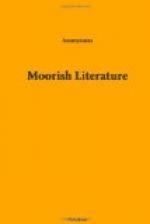III
The sheik Sidi Hammad, son of Mahomet Mouley Ben-Nacer, has written his book in Amazir. It is entitled the “Kitab-amazir.” This work treats of obligations and traditions of things permitted and forbidden.
IV
There are 3,500 men in the Aglou country. They have 2,200 houses and 960 horses. This district is on the sea-coast and possesses a stone-harbor. There are barks which are used in fishing. The inhabitants were living in tranquillity when one day, as they were starting out to fish, a ship arrived off shore. They fled in fear and left it in the sea. The ship waited till midnight. Then it entered the port and ran up a red flag. It remained at anchor for fifteen days. The people of Aglou assembled day and night, big and little, even the horsemen before it. No one was missing. The chiefs of the town wrote letters which they sent to all the villages. They sent one to Sidi Hecham couched in these words: “Come at once. The Christians have made an expedition against us, and have taken this port.” Sidi Hecham sent messengers to all the provinces over which he ruled and said in his letters: “You must accompany me to the country of Aglou, for the Christians have made an expedition against us.” All the neighboring tribes assembled to march against the Christians. When Sidi Hecham had joined them he said, “You must raise a red flag like theirs.”
They raised it. When it was seen by those on the ship, a sailor came ashore in a small boat and approached the Mussulmans there assembled.




